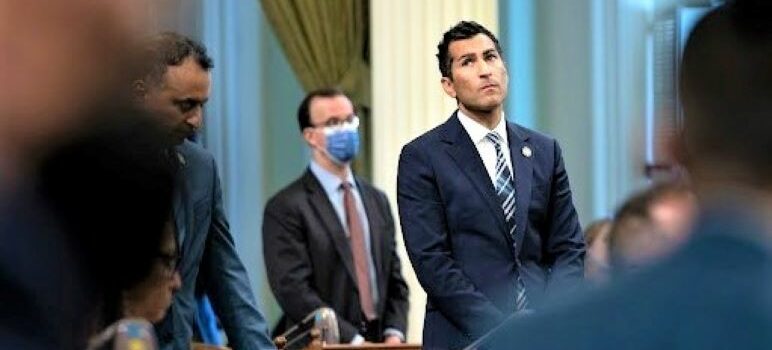This story includes updates, based on reporting from Politico.
Late Friday, just as California legislators were preparing to check out for the long holiday weekend, an earthquake rocked the California political world: Assemblymember Robert Rivas, a Hollister Democrat, announced that he had “secured enough votes” to become the next speaker of the California Assembly.
Rivas, a progressive whose current 30th District includes portions of southern Santa County, including Gilroy and Morgan Hill, made the declaration via a brief press release.
In a series of tweets on Memorial Day, Rivas restated that he had the necessary support – sources said 34 members of the 58-member Democratic caucus had signed cards pledging their support to Rivas late last week – and said “it was “time to unite the caucus and determine a thoughtful, reasonable transition period” and that he wanted to ensure the “transition is a respectful one.”
“The process of securing the necessary votes to affirm me as the next Speaker has taken place and I have a solid majority of the caucus,” Rivas had tweeted. Then, within minutes, Rivas deleted the tweets.
After a weekend of lobbying, jockeying and speculating, then a flurry of parliamentary maneuvers and a six-hour closed-door caucus meeting on Tuesday, Rivas’ campaign for speaker ended abruptly. California Assembly Democrats finally came to a decision about who ought to serve as their leader, current Speaker Anthony Rendon, a five-term Southern California Assembly member who has been speaker since 2016.
The announcement came not with a bang but a whimper: At 8pm March 31, Rendon and Rivas issued a joint statement.
From Rivas: “I agree with the majority of our current caucus that Speaker Rendon should remain as Speaker for at least the rest of this legislative session.”
From Rendon: “I applaud Robert Rivas for securing the support of a majority of the current Democratic Caucus to succeed me as Speaker of the Assembly.”
Politico's California Playbook on Tuesday reported that the weekend spotlight was on Rivas’ wife after reporters dug up old anti-abortion tweets in which she proclaimed “abortion abolitionists unite!” and that “'liberal abortion legislation” incentivizes “risky sexual behavior.” She has since deleted her account, Politico reported. Rivas voted for pro-abortion rights bills on the Assembly floor this past week.
Political opponents were also studying the paper trail of Rick Rivas, brother of the Assembly member, who has worked for various organizations that are active in California politics while his consulting firm has earned thousands of dollars from his brother’s campaigns.
Rendon, who is seeking election to a new, redrawn 62nd Assembly District, was first elected in 2012 in the 63rd District, both in southern Los Angeles County. If elected, he will be termed out of the Legislature in 2024, creating a definitive expiration date on his position at the top.
Rivas is seeking election to a new, redrawn 29th Assembly District, and was first elected to the 30th District in 2018. The new district no longer includes Morgan Hill, but still includes Gilroy.
This probably isn’t the first time a member has taken a crack at unseating the leader. Last year, Rendon unceremoniously stripped Cupertino Democrat Evan Low of a coveted committee leadership role in what was rumored to be retaliation for an attempt at Rendon’s job. Low is a Rivas ally and could have been well-positioned with his friend in the top spot.
There was trouble within the Democratic ranks last week when a handful of Democrats attempted to force a vote on a bipartisan gas tax suspension proposal — a direct challenge to Rendon’s control of the chamber.
The election of a speaker is a two-step process. First there has to be a majority vote from the Assembly’s 58 Democrats, followed by a vote of all 78 Assembly members (two seats are vacant). As of noon today, no official vote had been taken.
It may not be entirely bad news for Rivas. A majority of the current caucus really does want him (for now) to become the next speaker (at some point). The question is whether that will still hold true once other ambitious members start jockeying again — and after 13 current Assembly Democrats leave after this session. With the exodus of lawmakers this year, the internal caucus politics could be very different in 2023.
Watch the money: Since 2019, Rivas has transferred $400,000 from his own campaign account to candidates and Democratic Party organizations, including nearly $200,000 to Assembly candidates. But Rendon and other aspiring speakers may want to throw some campaign cash around, too.
Rivas told CalMatters Tuesday night: “This is an important first step in working with Speaker Rendon to build a transition that works…There’s going to be a large class coming in, and I’m excited to work with them and start to plan for the future.”
But some of Rendon’s allies don’t have a transition in mind. Sacramento Democrat Kevin McCarty said Tuesday that Rendon plans to run again for speaker next year and that while Rivas may have a big lead over any other challenger, without a formal agreement, he’s still just in the race to succeed Rendon.

